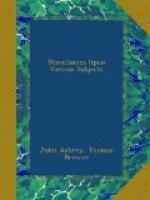Within this shire I believe that there were several Reguli, which often made war upon one another, and the great ditches which run on the plains and elsewhere so many miles, were (not unlikely) their boundaries, and withall served for defence against the incursion of their enemies, as the Picts’ Wall, Offa’s Ditch, and that in China; to compare small things to great. Their religion is at large described by Csesar; their priests were the Druids. Some of their temples I pretend to have restored; as Anbury, Stonehenge, &c., as also British sepulchres. Their way of fighting is livelily set down by Caesar. Their camps, with those of their antagonists, I have set down in another place. They knew the use of iron; and about Hedington fields, Bromham, Bowdon, &c. are still ploughed up cinders (i. e. the scoria of melted iron). They were two or three degrees I suppose less salvage than the Americans. Till King John’s time wolves were in this island; and in our grandfathers’ days more foxes than now, and marterns (a beast of brown rich furr) at Stanton Park, &c. the race now extinct thereabout.
The Romans subdued and civilized them; at Lekham (Mr. Camden saith) was a colony of them, as appears there by the Roman coin found there. About 1654, in Weekfield, in the parish of Hedington, digging up the ground deeper than the plough went, they found, for a great way together, foundations of houses, hearths, coals, and a great deal of Roman coin, silver and brass, whereof I had a pint; some little copper-pieces, no bigger than silver half-pence (quaere if they were not the Roman Denarii) I have portrayed the pot in which a good deal was found, which pot I presented to the Royal Society’s Repository, it resembles an apprentice’s earthen Christmas-box.
At Sherston, hath several times been found Roman money in ploughing. I have one silver piece found there (1653) not long since, of Constantine the Great. Among other arts, that of architecture was introduced by them; and no doubt but here, as well as in other parts, were then good buildings, here being so good stone: I know not any vestigia now left in this country, except the fragments of the Castle of Salisbury, which takes its name from Caesar, Caesarisburghum, from whence Sarisburgh, whence Salisbury.
At Bath are several Roman inscriptions, which Mr. Camden hath set down, and by the West Gate a piece of a delicate Corinthian freeze, which he calls wreathed leaves, not understanding architecture; and by in a bass relieve of an optriouch. At Bethford, about 1663, was found a grotto paved with Mosaic work, some whereof I have preserved.




